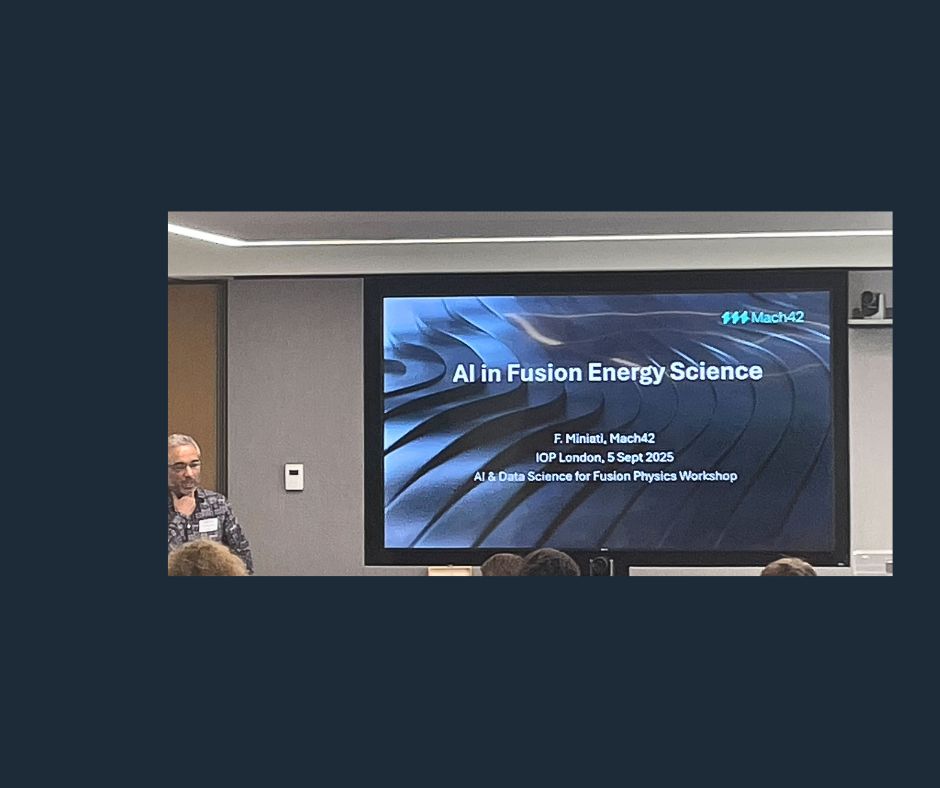AI in Fusion Energy Science

Leading scientists of the Prosperity Partnership Amplifi (PPA), including Imperial College London, the University of Oxford Department of Physics, University of Oxford Department of Engineering, University of York, First Light Fusion and Mach42, gathered at the Institute of Physics new building near King’s Cross in London for the first 𝗔𝗜 & 𝗗𝗮𝘁𝗮 𝗦𝗰𝗶𝗲𝗻𝗰𝗲 𝗳𝗼𝗿 𝗙𝘂𝘀𝗶𝗼𝗻 𝗣𝗵𝘆𝘀𝗶𝗰𝘀 Workshop to discuss best practices and future directions of integration of AI/ML in fusion energy research. The group consisted of a mix of cross-generational experimentalists, numerical simulators, ML practitioners and data and computer scientists. While a variety of topics were presented during the talk sessions and group discussions a few overarching themes emerged, namely:
-
Training and Education
-
Inverse problems
-
Surrogate models
-
Data science
Fusion energy is a growing field of research promising to reshape the energy landscape worldwide and attracting new scientists every year from physics, engineering and applied mathematics. The spectacular rise of AI/ML has also made notable inroads into this field, where there is great expectation for AI/ML to help solve the formidable technical challenges. Its fast growth in adoption, however, has also meant that great heterogeneity in understanding the basic concepts and language of AI/ML remains. These need to be tackled through well thought out training and educational programs, so that coming generations of students and postgraduates who lead the research effort can use this novel technology most successfully.
The scientific activity in fusion energy, including theoretical analysis, mathematical and numerical modeling, and experimental efforts, is aimed at understanding the plasma behavior to ultimately drive a controlled fusion process. The results of these efforts ultimately interface in the development of plasma diagnostics which remain difficult and crucial at the same time. Here, scientists are faced with a complex inverse problem where the parameters of interest cannot be easily inferred, either directly or indirectly, from the experimental data. AI/ML technology is exploited for effective solutions, but optimization of design thereof remains an important topic of discussion.
In this context the main challenges arise from the development of suitable forward models. On the one hand, high-fidelity is fraught with difficulties. Real-world experiments are affected by numerous subtle, hard-to-parametrize factors, while simulators must make simplifying assumptions for feasibility. These include reducing geometrical dimensionality or using idealized concepts like a single plasma temperature. On the other hand, despite the necessary simplifications, due to their time complexity, forward models remain the main bottleneck for inverse problem solutions. Surrogate models can help with both issues of high-fidelity, as they can be trained not only on simulation but also experimental data, and time-complexity, as the model representation can execute very efficiently even on non-accelerated hardware.
Development of surrogates is still an active and rapidly evolving field of research but, in addition to the architectural design and learning and training strategy, the availability of training data of sufficiently good quality and in sufficient amounts remains important. This issue arises both with experimental data, where experiments can be time consuming to set up and expensive to carry out as well as synthetic data, which require significant computational power to obtain, particularly for realistic multi-physics, three-dimensional models. Pulling together data resources through the implementation of shared databases accessible to community users might be an effective way to alleviate the problem. Data standardization through fully descriptive metadata and provenance for both experimental and simulation data, would be a basic requirement to allow for proper discoverability, meta-analysis, anomaly detection, data-analytics.
Mach42 continues to work in the Fusion Energy space and its Prosperity Partnership Amplifi colleagues to deliver optimal AI/ML driven solutions for inverse problems powered by state-of-the-art surrogate models.
